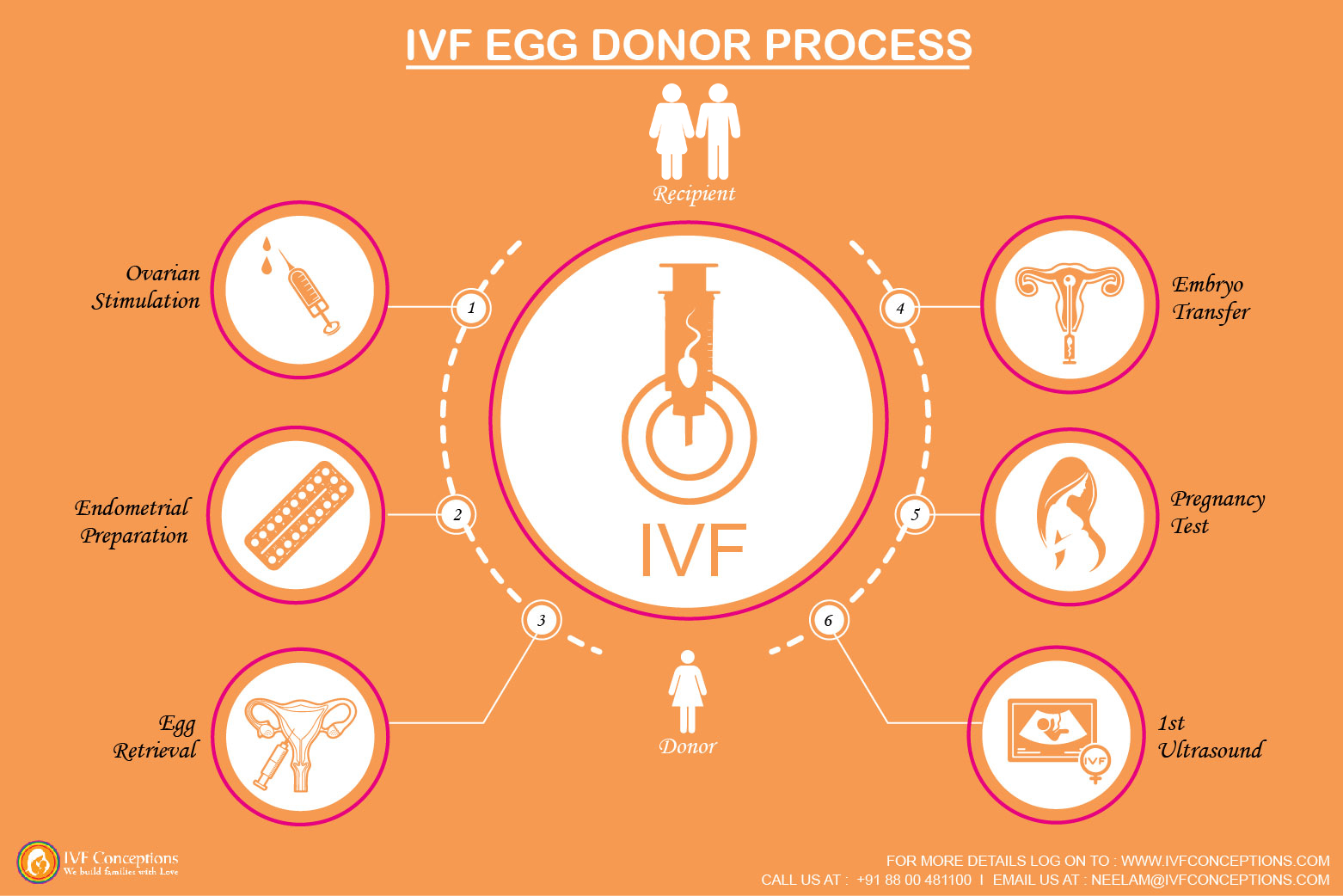IVF with egg donor process is a common form of the Assisted Reproduction Technique (ART) which makes families possible for childless couples around the world.
Intending mothers who are unable to provide healthy eggs can opt for IVF with the egg donation process, thus enjoying a new lease on life in the safest manner possible. Let’s see in the infographic representation, how does IVF Egg Donor Process Work.
Egg donation relates to the process wherein a female egg donor readily consents to donate her unfertilized eggs to an IVF clinic or recipient (in this case the intended parent). The eggs received from the donor are fertilized clinically and the resulting embryos are transferred via IVF to a carrier who can either be the intended mother or a surrogate as arranged by the IVF clinic.
We ensure to work within the country’s legal framework, thus protecting the interests of both parties involved in order to minimize hassles later on. The egg donor risks and outcomes are shared with the potential candidate so that they can make informed decisions.
Read more about IVF with egg donation:
All you need to know about IVF with an egg donor?
Pros and cons of egg donations
Everything you need to know about the egg donor process
 How Does IVF Egg Donor Process Work?
How Does IVF Egg Donor Process Work?
The IVF (In Vitro Fertilization) egg donor process involves several steps to help individuals or couples who are unable to conceive using their own eggs. Here is a comprehensive explanation of how the IVF egg donor process works:
- Initial Consultation: The process begins with an initial consultation with a fertility specialist or doctor. They will evaluate the individual or couple’s medical history, perform necessary tests, and discuss the options and implications of using an egg donor for IVF.
- Finding an Egg Donor: There are various sources for finding an egg donor, including known donors (such as a friend or family member) or anonymous donors through egg donor agencies or fertility clinics. The fertility doctor can provide guidance on the available options.
- Donor Selection: The fertility clinic conducts a thorough selection process to identify a suitable egg donor. This process involves assessing the donor’s medical history, genetic screening, and psychological evaluation.
- Synchronization: Once an egg donor is selected, the menstrual cycles of the donor and the recipient (the intended mother or gestational carrier) are synchronized using hormonal medications. This ensures that the recipient’s uterus is prepared to receive the embryos created from the donor’s eggs.
- Ovarian Stimulation: The egg donor undergoes ovarian stimulation using fertility medications. These medications help stimulate the ovaries to produce multiple mature eggs during one menstrual cycle. The donor will self-administer the medications through injections under the skin or into a muscle. Regular monitoring through blood tests and ultrasounds is conducted to track the response to the medications and the growth of follicles (fluid-filled sacs in the ovaries that contain the eggs).
- Egg Retrieval: When the follicles are mature, an egg retrieval procedure is performed. The donor is typically sedated or given anesthesia to ensure comfort during the procedure. A doctor uses transvaginal ultrasound guidance to guide a needle into the follicles and retrieve the eggs from the donor’s ovaries. The eggs are collected in a laboratory dish and immediately assessed for their quality.
- Fertilization: After the eggs are retrieved, the intended father’s sperm or donor sperm is used to fertilize the eggs in the laboratory. The fertilization can be achieved through conventional IVF (mixing the eggs and sperm in a dish) or through intracytoplasmic sperm injection (ICSI), where a single sperm is injected directly into each mature egg. The embryos are then monitored for development and growth.
- Embryo Transfer: Once the embryos reach a suitable stage of development, typically after 3 to 6 days, one or more embryos are selected for transfer to the recipient’s uterus. The embryo transfer is a relatively simple procedure that involves the insertion of a thin catheter through the cervix into the uterus, where the embryos are carefully placed. Any remaining viable embryos may be cryopreserved (frozen) for future use, if desired.

How we can help you with finding an egg donor which is perfect for you?
- Discuss and take you through the egg donor process – and time frame steps wisely.
- A huge database of traveling egg donors who come to your IVF clinics to donate.
- Best egg donor countries options with costs, process, legal, risks, and opportunities.
- Recommendations on trustworthy IVF providers, surrogacy agencies, egg donor agencies, reproductive lawyers, and other surrogacy professionals.
- Information and guidelines in selecting egg donors for the maximum success rate of IVF.
- Tips on travel, accommodation, and local support during the local visit.
- Introduction to previous parent reference, if needed
- Introduction to reputed embryo shippers’ companies globally
- Managing the full surrogacy process with 24*7 access at no extra cost!
If you’d like to learn more about IVF, Egg Donation, or surrogacy services globally, check out the rest of our website at IVF Conceptions. We offer legally secure and affordable surrogacy services to build families with love.
Our surrogacy consultancy is free of cost. We do not charge any fee and make sure that you are well aware of all your options to make an informed decision.
Stop postponing and start your journey Now. Together we can make parenthood possible!

FAQ about IVF Egg Donor Process
Egg donor IVF is a fertility treatment option for individuals or couples who cannot use their own eggs for various reasons. It involves retrieving eggs from a donor and fertilizing them with sperm in a lab. The resulting embryos can then be transferred to the intended mother’s uterus or a gestational carrier’s uterus, or they can be frozen for future use.
Egg donor IVF may be recommended or required in the following situations: – Age-related infertility, typically for women aged 40 or older. – Genetic disease risk on the female partner’s side. – Low ovarian reserves, indicated by high FSH levels or a low antral follicle count. – Primary ovarian insufficiency or premature ovarian failure. – Post-cancer treatment that damaged or removed the ovaries or eggs. – Repeated canceled IVF treatment due to poor ovarian response. – Unexplained repeated IVF failure. – Congenital anomaly where a woman is born without ovaries. – Single males or gay male couples using a gestational carrier.
There are several common sources for finding an egg donor: – Friend or family member who is willing to donate. – Another infertile couple willing to share their retrieved eggs. – Egg banks that offer frozen eggs. – Egg donor agencies that facilitate the matching process between donors and recipients.
The egg donor IVF process involves several steps: a. Screening: Both the egg donor and the intended parents undergo thorough medical and psychological screenings. b. Synchronization: The donor’s menstrual cycle is synchronized with the recipient’s cycle using hormonal medications. c. Ovarian stimulation: The donor receives fertility medications to stimulate the production of multiple eggs. d. Egg retrieval: The eggs are retrieved from the donor’s ovaries using a minor surgical procedure called transvaginal ultrasound-guided egg retrieval. e. Fertilization: The retrieved eggs are combined with sperm in a laboratory to achieve fertilization. f. Embryo transfer: The resulting embryos are transferred to the intended mother’s uterus or a gestational carrier’s uterus. Any remaining embryos can be frozen for future use.
The success rates of egg donor IVF are generally higher than the average IVF success rates for couples not using a donor’s eggs. The success can vary depending on factors such as the age of the egg donor, the quality of the eggs, and the overall health of the recipient. It’s best to consult with your fertility doctor for personalized information regarding success rates.
The egg donor IVF process carries potential risks and side effects, including ovarian hyperstimulation syndrome (OHSS), bleeding, infection, discomfort, and rare complications associated with anesthesia. However, the procedure is generally considered safe, and complications are infrequent. Both the donor and recipient should discuss the potential risks with their healthcare providers.
Yes, it is possible for an egg donor to donate eggs more than once. However, it is important to consider the potential impact on the donor’s own fertility and discuss the details with the fertility clinic or egg donor program.
Reference Used:
https://www.verywellfamily.com/egg-donor-ivf-basics-4114768
https://www.mayoclinic.org/tests-procedures/in-vitro-fertilization/about/pac-20384716


 How Does IVF Egg Donor Process Work?
How Does IVF Egg Donor Process Work?